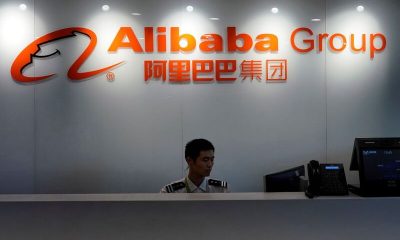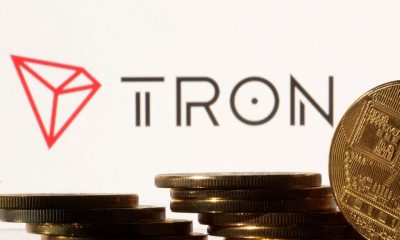Tech
Nvidia, other US chip stocks stall overvaluation, industry worries.
After a stunning 2023 rise, some of the luster is starting to fade from shares of Nvidia (NVDA.O) and other American semiconductor companies as investors consider exorbitant valuations, increasing Treasury yields, and indications of industry uneasiness.
At the beginning of the year, chip stocks skyrocketed, with the Philadelphia SE Semiconductor Index (.SOX) surging more than 50% by the end of July. Nvidia, whose shares tripled in value in 2023 as the company’s market worth surpassed $1 trillion, thanks to excitement over the company’s products’ crucial position in artificial intelligence applications, was the stock that most represented the semiconductor industry’s prosperity.
However, the group’s performance has plateaued. The broad S&P 500 (.SPX) is down 2.3% this month, while the SOX semiconductor index is down almost 7%. Shares of Nvidia, a key factor in the market’s surge this year, were down more than 14% in September.
King Lip, chief investment strategist at Baker Avenue Wealth Management, said, “They have lost some momentum.” “A lot of these chip names have received an AI boost. That enthusiasm has somewhat subsided in places.
This year, values soared in tandem with stock prices. According to LSEG Datastream, the 21-stock S&P 500 industry group for semiconductors and semiconductor equipment (.SPLRCSE) was trading at 28.5 times forward 12-month earnings projections at the end of July, compared to its 10-year average P/E of 16.5 times.
Despite the reductions this month, the company still has a projected P/E of 23.5 times.
According to Kevin Mahn, president and chief investment officer at Hennion & Walsh Asset Management, the recovery from the epidemic and the competition for AI-related innovation boosted semiconductor stocks.
You are now beginning to doubt valuations because of “some of the names that really have catapulted to the top,” Mahn remarked.
The increase in Treasury yields is putting more pressure on valuations. Higher yields on Treasury securities, regarded as almost risk-free investments, provide equities with investment competition and are considered a riskier asset class.
After the Federal Reserve signaled a policy of interest rates staying higher for longer, yields increased on Wednesday, with two-year yields reaching 17-year highs.
Even though Nvidia’s revenue projection when it released its quarterly results in late August greatly exceeded forecasts, the company has since been struggling. Lam Research (LRCX.O), down 12%; Applied Materials (AMAT.O); and KLA Corp. (KLAC.O), all down approximately 10%, were other significant semiconductor stock decliners in September.
According to VandaTrack, a company that monitors retail behavior, interest from retail investors in the AI field is also declining.
Investors said that difficulties related to the group’s industry, such as ongoing hostilities over semiconductors between the United States and China, are also having an impact. Following export limits last year to cut off China from specific semiconductor chips created anywhere in the world with U.S. equipment, Washington is now proposing limitations on sales of AI microchips.
In yet another setback, Reuters reported on Friday that Taiwan’s TSMC (2330. TW), the world’s largest contract chipmaker, has instructed its main suppliers to postpone the delivery of high-end chipmaking equipment. Following the report, shares of several TSMC suppliers decreased.
The initial excitement surrounding Arm Holdings’ IPO last week has subsided, as the chip designer’s shares are down for a sixth straight day.
Of course, several semiconductor stocks have made significant gains this year, and this month’s decline might merely be a blip.
According to Mahn, whose company owns shares of Analog Devices (ADI.O) and Broadcom (AVGO.O), investors should seek out dividend-paying semiconductor companies with robust balance sheets trading at fair prices.
Mahn stated, “I think there are opportunities in semiconductor stocks in the future.
TECH
Chinese retailers offer deep iPhone 15 discounts.
Chinese e-commerce sites, including JD.com (9618. HK), PDD Holdings (PDD.O), and Alibaba’s (9988. HK) Taobao, are giving steep discounts on Apple’s (AAPL.O) newest iPhone 15, with some retailing for as little as 1,501 yuan ($205.14) less than the suggested retail price.
Analysts claim that compared to its predecessor, the iPhone 15 has not been selling as well in China. In the first 17 days following its market introduction, Counterpoint Research reported this week that sales of the iPhone 15 in China were down 4.5% from those of the iPhone 14 in that country.
Apple periodically permits its Chinese partner merchants to give discounts to increase demand. However, as customers tighten their pockets in a weakening economy, Chinese e-commerce platforms have also engaged in a “value for money” war, discounting a prominent feature of an approaching annual Singles Day shopping festival.
Unlike Apple’s official pricing of 8,999 yuan, JD.com offers the 512 GB iPhone 15 for 7,498 yuan. When questioned about the reduction, the business claimed that it was consistent with the low-price selling strategy it had started this year.
According to Reuters’ research, Pinduoduo is selling the 128 GB iPhone 15 Plus for 6,098 yuan, which is 900 yuan cheaper than Apple’s suggested retail price of 6,999 yuan.
On Alibaba’s e-commerce site Taobao, the 512 GB iPhone 15 Pro Max, which costs 11,999 yuan at Apple’s store, is available for 10,698 yuan.
Requests for comment from Apple, Pinduoduo, and Alibaba were not immediately fulfilled.
The Economic Observer weekly publication broke the news of the iPhone 15 reductions on the e-commerce sites on Monday.
Tech
Biden administration picks 31 regional tech hubs to spur US innovation.
From 370 applications, the U.S. Commerce Department announced on Monday that it had selected 31 regional tech centers. These places are now eligible for $500 million in government financing to support innovation and growth in various industries.
According to Secretary of Commerce Gina Raimondo, the program aims to diversify the American economy away from traditional tech strongholds like Silicon Valley, Seattle, and Boston.
“Those tech ecosystems are concentrated in just a few places around the country,” Raimondo stated. They don’t accurately represent our nation’s potential. They don’t have a monopoly on brilliant concepts.
To encourage greater private sector investment in sectors like the manufacture of semiconductors, clean energy, and batteries for electric vehicles, President Joe Biden believes that the government should help support important sectors.
The regional technology initiative, according to Lael Brainard, National Economic Director for the White House, “makes smart public investments in critical technologies in every region of the country.”
This month, the Biden administration announced that seven “hydrogen hubs” in 16 states would split $7 billion to help the new business get off the ground.
The designated regional tech clusters are concentrated on fields like semiconductors, clean energy, essential minerals, biotechnology, artificial intelligence, and quantum computing. They are in states including Montana, Wisconsin, upstate New York, Vermont, Illinois, and Puerto Rico.
“People shouldn’t have to move to get a good job,” Raimondo added, pointing out that many centers are in small communities.
While an Oklahoma center aims to commercialize autonomous systems in industries like agriculture and pipeline inspections, Washington state and Idaho hubs will concentrate on creating new materials for more fuel-efficient next-generation airplanes. Personalized medicine is being developed as part of a Wisconsin effort.
No classification as a hub ensures federal money.
According to Raimondo, the government would give up to $75 million to each of the 31 IT clusters the following year.
As part of the historic “Chips and Science” law, which allocates $52 billion for American semiconductor manufacture and research to better compete with China, Congress granted $500 million for the initiative in August 2022.
This year, Biden requested $4 billion from Congress to support more local tech clusters. Congress has not yet approved a full-year budget for the current fiscal year.
Tech
Taiwan’s Foxconn faces China tax probe, seen as politically motivated.
Two people close to Foxconn (2317. TW), a significant supplier of Apple’s (AAPL.O) iPhones, acknowledged Monday that the company is subject to a tax investigation in China. They claimed that they believed a state-backed tabloid had published the investigation for political reasons related to Taiwan’s impending elections.
China’s state-backed Global Times newspaper said on Sunday that the country’s natural resources department had undertaken on-the-ground investigations into the usage of land by Foxconn firms in the provinces of Henan and Hubei, among other places, and that several of the company’s important Chinese subsidiaries were the subject of tax audits.
Due to the delicacy of the situation, the two sources asked to remain anonymous. They claimed that Chinese authorities had audited several corporations recently, but according to their belief, only Foxconn’s investigation had been made public.
According to the sources, the audits are taking place as Foxconn tries to increase manufacturing outside of China less than three months before Taiwan’s presidential election.
Taiwan’s administration routinely charges Beijing with trying to use military or economic pressure to alter the results of its elections to achieve a result favorable to China. Taiwan is a territory that China claims as its own.
Terry Gou, the creator of Foxconn and the last CEO of the business, is running for president as an independent.
By running, Gou would split the opposition vote, perhaps securing a victory for current Vice President Lai Ching-te, who is currently ahead in the polls, The Global Times said in an English-language article late on Sunday.
Beijing hates Lai because it sees him as a separatist. He claims Beijing has rejected his offers of dialogue, and Beijing alone can decide Taiwan’s destiny.
Gou’s decision to run for office “is likely to further split the island’s opposition camp, and this will ultimately favor secessionist ruling Democratic Progressive Party candidate Lai Ching-te,” the Global Times cited unidentified analysts.
IMPROVEMENT OUTSIDE OF CHINA
The Chinese government has made no formal announcement on the audits of Foxconn.
Local officials in the provinces of Henan, Hubei, Guangdong, and Jiangsu, who the Global Times claimed were carrying out the audits and investigations, did not immediately reply to faxed requests for comment from Reuters.
Previously known as Hon Hai Precision Industry Co Ltd, Foxconn employs hundreds of thousands of people in China and is a significant investor there. Beijing frequently cites Foxconn as an example of Taiwanese investors’ success in the nation.
The business has been working hard to diversify its production base outside of China, and the first source told Reuters that they saw the audit as a “warning” to Foxconn.
Their economy is struggling. Seeing big corporations like us go to India is a warning,” the person claimed.
They demand that you choose a side. The first source stated, “You may either stay with us or go.
The audit was “unexpected” and “relatively unusual,” according to the second source.
In a statement released on Sunday, Foxconn stated that adhering to the law was a “fundamental principle” of its business practices and that it would “actively cooperate with the relevant units on the related work and operations.”
Foxconn declared it had no more comments on Monday.
Requests for a response from China’s Taiwan Affairs Office were not immediately fulfilled. The Taiwanese government assisted Foxconn, but Premier Chen Chien-jen did not specify how.
On Monday, the price of Foxconn shares fell 2.9%, outperforming the decline of the broader market (.TWII) of 1.2%.
Election on “WAR OR PEACE”
Gou, the wealthy creator of Foxconn, has fallen behind in the polls despite waging a prominent presidential campaign.
He claims that only with his broad professional and social connections in China and the United States can he keep the peace after the island’s dominant Democratic Progressive Party (DPP) brought the region to the verge of conflict with China through its antagonistic policies.
Huang Shih-hsiu, a spokeswoman for Gou’s campaign, directed inquiries about the Foxconn investigation to the business, noting that Gou was no longer on the board and was now merely a stakeholder.
But today, the Foxconn investigation is a political topic.
When questioned about the Foxconn investigation on Monday, Hou Yu-ih, the presidential candidate for Taiwan’s largest opposition party, the Kuomintang, which has framed the election as a “war or peace” vote, stated that Taiwan corporations fear the most instability between Taiwan and China.
The DPP candidate Lai, who is now in the lead in the polls, said the Chinese news on the inquiry was “unexpected” and “regretful” in his speech at a rally on Sunday.
On Monday, DPP spokesperson Chang Chih-hao stated that “Taiwanese businesses have always contributed to China’s economic development.”
“However, the Chinese communists often use Taiwanese businesses as a bargaining chip for political pressure or election interference against Taiwan.”
-

 Geopolitics & Foreign Policy2 months ago
Geopolitics & Foreign Policy2 months agoTurkey’s Erdogan says he may visit Egypt soon, discuss Gaza patients -media.
-

 Europe3 months ago
Europe3 months agoRussia’s Shoigu accuses the West of seeking to expand the Ukraine war to the Asia-Pacific.
-

 Geopolitics & Foreign Policy2 months ago
Geopolitics & Foreign Policy2 months agoCeasefire takes hold in Gaza ahead of hostage release; aid enters enclave.
-

 Geopolitics & Foreign Policy2 months ago
Geopolitics & Foreign Policy2 months agoRussia deploys new nuclear missile in Kaluga region – RIA
-

 America4 months ago
America4 months agoRepublican US House to hold first Biden impeachment inquiry hearing
-

 Geopolitics & Foreign Policy2 months ago
Geopolitics & Foreign Policy2 months agoChina’s military: US Navy ship ‘illegally’ entered territorial waters
-

 Europe3 months ago
Europe3 months agoZelenskiy, at NATO HQ, asks for weapons to face winter of ‘terror’
-

 Agriculture4 months ago
Agriculture4 months agoIAEA, Japan agree on continuous safety review of Fukushima water


















